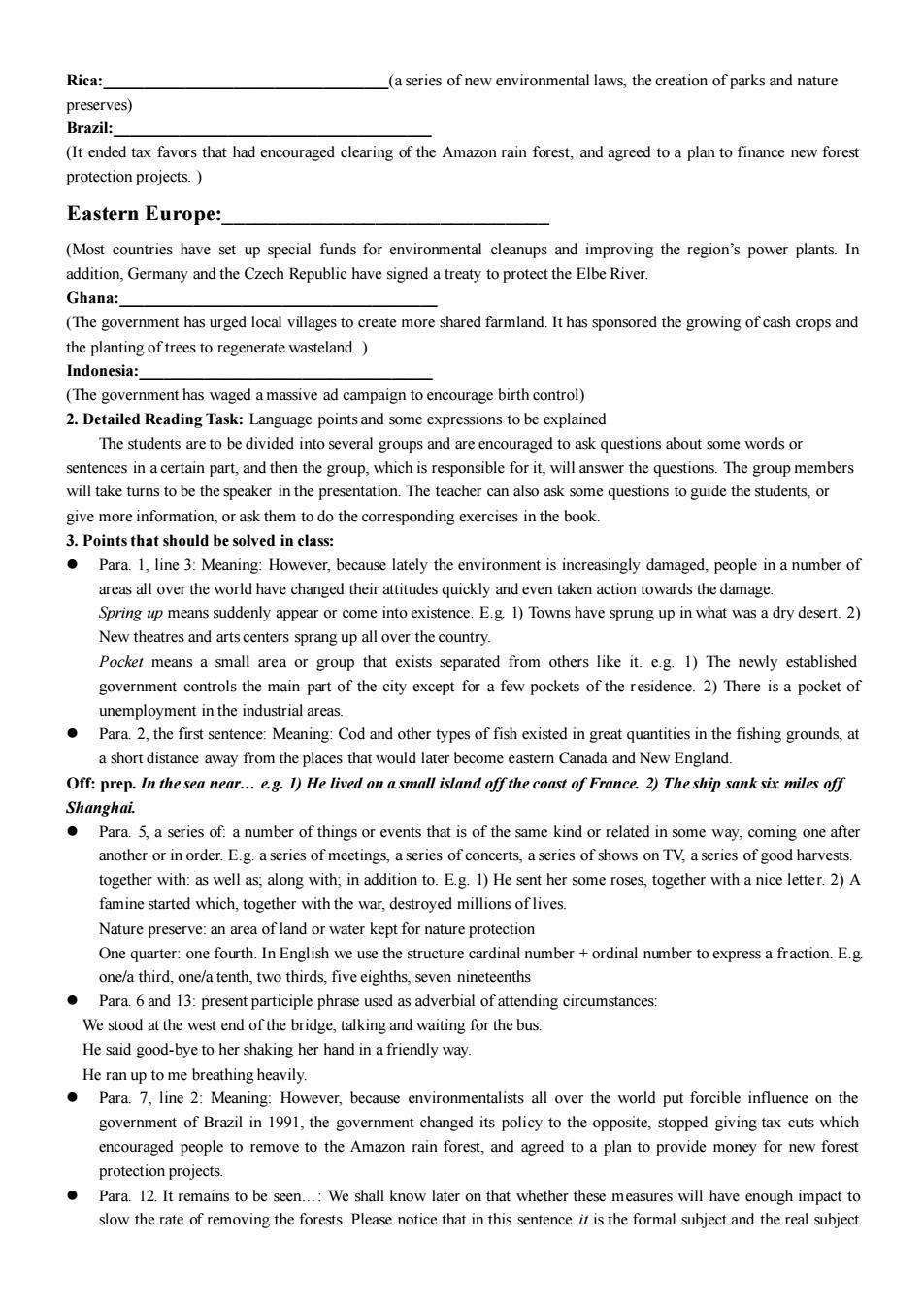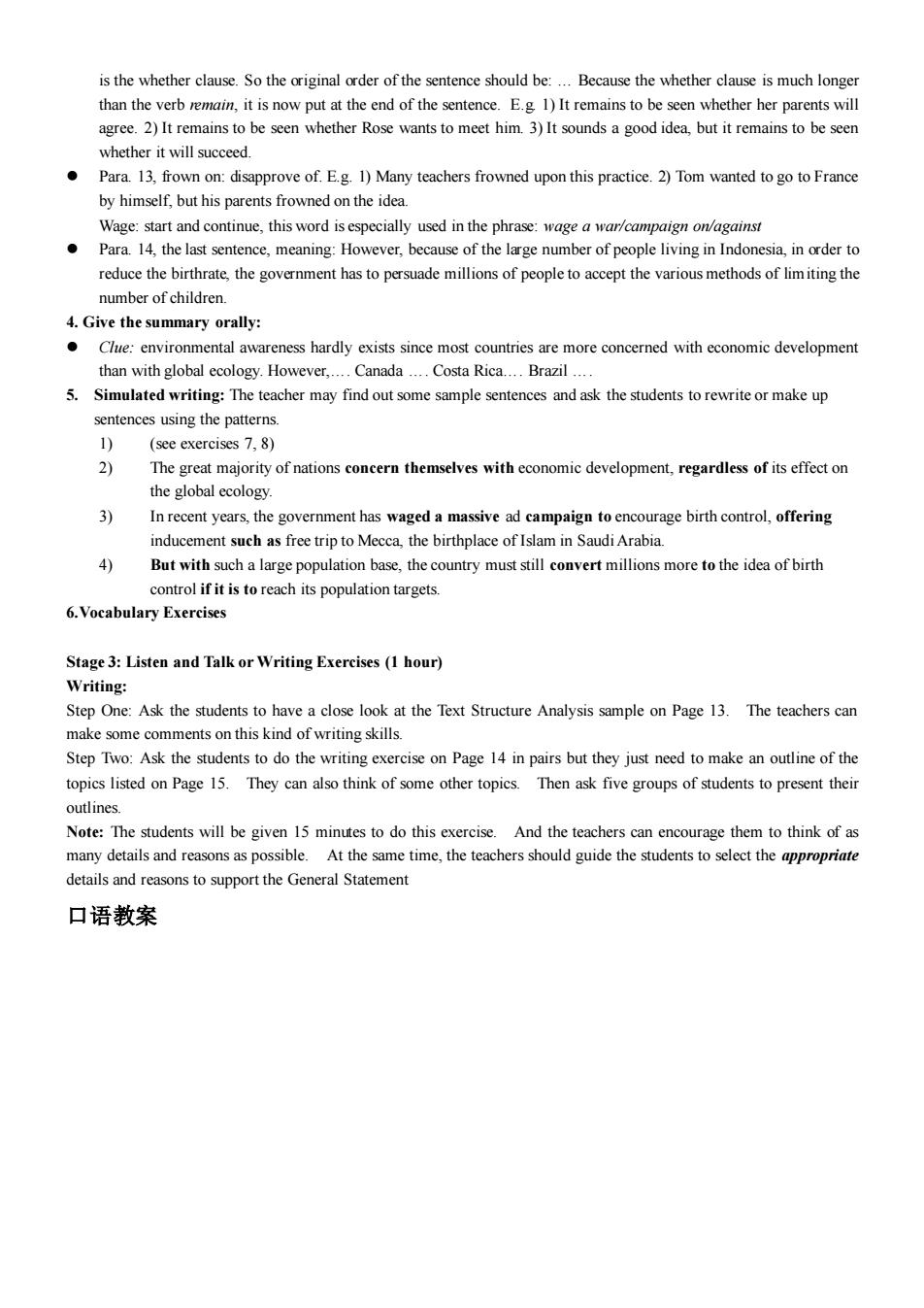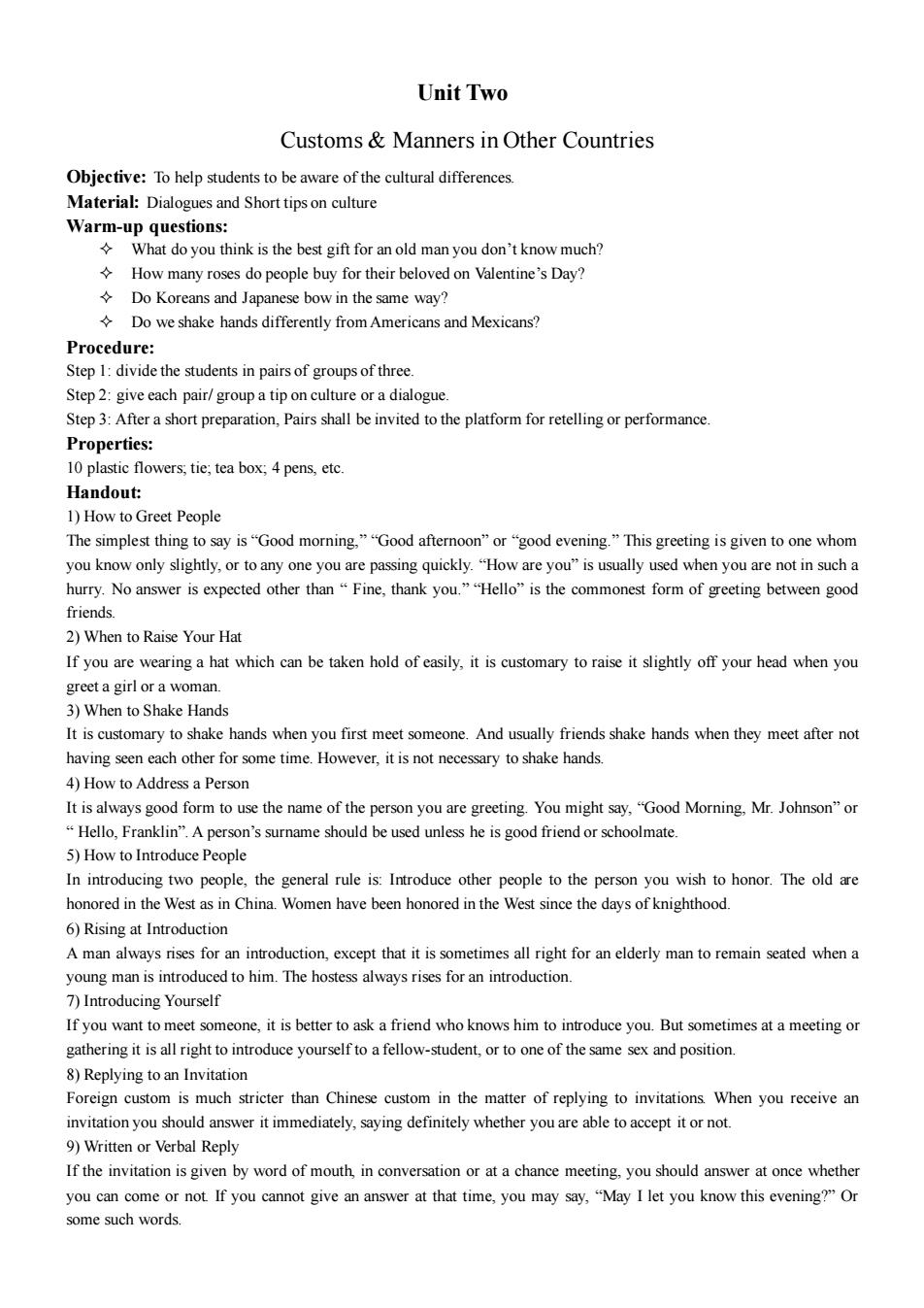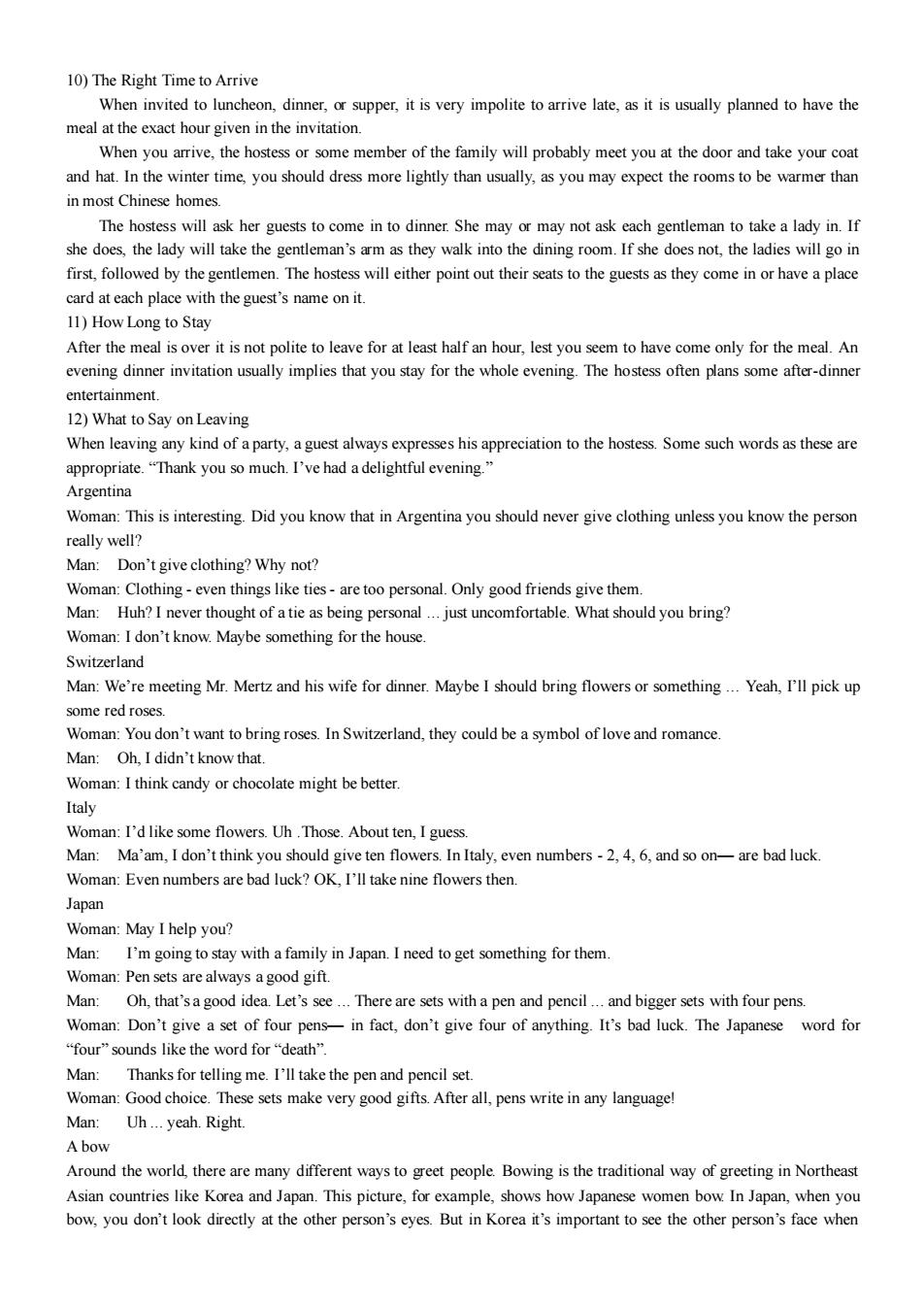
Rica:(a series of new environmental laws,thecreation ofparks and naturepreserves)Brazil:(It ended tax favors that had encouraged clearing of the Amazon rain forest, and agreed to a plan to finance new forestprotection projects.)EasternEurope:(Most countries have set up special funds for environmental cleanups and improving the region's power plants. Inaddition, Germany and the Czech Republic have signed a treaty to protect the Elbe River.Ghana(Thegovernment has urged local villages to create more shared farmland. It has sponsored thegrowing ofcash crops andthe planting of trees to regenerate wasteland.)Indonesia:(The government has waged a massive ad campaign to encourage birth control)2. Detailed Reading Task: Language points and some expressions to be explainedThe students are to bedivided into several groups and are encouraged to ask questions about some words orsentences in acertain part, and then the group,which is responsible for it, will answer the questions.The groupmemberswill take turns tobe the speaker in thepresentation.Theteacher can also ask some questions toguide the students, orgive more information, or ask them to do the corresponding exercises in the book.3.Points that should be solved in class:Para.1,line3:Meaning:However,becauselatelytheenvironment is increasinglydamaged,peopleinanumber ofareas all over the world have changed their attitudes quickly and even taken action towards the damage.Spring up means suddenly appear or come into existence.E.g I) Towns have sprung up in what was a dry desert. 2)New theatres and arts centers sprang up all over the country.Pocket means a small area or group that exists separated from others like it. e.g. 1) The newly establishedgovernment controls the main part of the city except for a few pockets of the residence. 2) There is a pocket ofunemployment in the industrial areasPara. 2, the first sentence: Meaning: Cod and other types of fish existed in great quantities in the fishing grounds, atashortdistanceawayfromtheplacesthatwould laterbecomeeasternCanadaandNewEngland.Off: prep. In the sea near..e.g.I) He lived on a small island off the coast of France.2) The ship sank six miles offShanghai.Para.5,a seriesofa number ofthings or events that is ofthe samekind or related in some way,coming one afteranother or in order. E.g. a series of meetings, a series of concerts, a series of shows on TV, a series of good harvests.together with: as well as; along with; in addition to. E.g. 1) He sent her some roses, together with a nice letter. 2) Afaminestarted which,together withthewar,destroyedmillionsoflives.Nature preserve:an area of land or waterkeptfor nature protectionOne quarter: one fourth.In English we use the structure cardinal number+ ordinal number to express a fraction.E.gone/a third, one/a tenth, two thirds, five eighths, seven nineteenthsPara. 6 and 13: present participle phrase used as adverbial of attending circumstances:We stood at the west end ofthe bridge,talking and waiting for the bus.He said good-bye to her shaking her hand in a friendly way.He ran up to me breathing heavily.Para. 7, line 2: Meaning: However, because environmentalists all over the world put forcible influence on thegovernment of Brazil in 1991, the government changed its policy to the opposite, stopped giving tax cuts whichencouragedpeopletoremovetotheAmazonrainforest,andagreedtoaplantoprovidemoneyfornewforestprotectionprojects.Para12.Itremains to be seen...:We shall know later on that whether these measures will have enough impact toslow the rate of removing the forests. Please notice that in this sentence it is theformal subject and the real subject
Rica:_(a series of new environmental laws, the creation of parks and nature preserves) Brazil:_ (It ended tax favors that had encouraged clearing of the Amazon rain forest, and agreed to a plan to finance new forest protection projects. ) Eastern Europe:_ (Most countries have set up special funds for environmental cleanups and improving the region’s power plants. In addition, Germany and the Czech Republic have signed a treaty to protect the Elbe River. Ghana:_ (The government has urged local villages to create more shared farmland. It has sponsored the growing of cash crops and the planting of trees to regenerate wasteland. ) Indonesia:_ (The government has waged a massive ad campaign to encourage birth control) 2. Detailed Reading Task: Language points and some expressions to be explained The students are to be divided into several groups and are encouraged to ask questions about some words or sentences in a certain part, and then the group, which is responsible for it, will answer the questions. The group members will take turns to be the speaker in the presentation. The teacher can also ask some questions to guide the students, or give more information, or ask them to do the corresponding exercises in the book. 3. Points that should be solved in class: ⚫ Para. 1, line 3: Meaning: However, because lately the environment is increasingly damaged, people in a number of areas all over the world have changed their attitudes quickly and even taken action towards the damage. Spring up means suddenly appear or come into existence. E.g. 1) Towns have sprung up in what was a dry desert. 2) New theatres and arts centers sprang up all over the country. Pocket means a small area or group that exists separated from others like it. e.g. 1) The newly established government controls the main part of the city except for a few pockets of the residence. 2) There is a pocket of unemployment in the industrial areas. ⚫ Para. 2, the first sentence: Meaning: Cod and other types of fish existed in great quantities in the fishing grounds, at a short distance away from the places that would later become eastern Canada and New England. Off: prep. In the sea near. e.g. 1) He lived on a small island off the coast of France. 2) The ship sank six miles off Shanghai. ⚫ Para. 5, a series of: a number of things or events that is of the same kind or related in some way, coming one after another or in order. E.g. a series of meetings, a series of concerts, a series of shows on TV, a series of good harvests. together with: as well as; along with; in addition to. E.g. 1) He sent her some roses, together with a nice letter. 2) A famine started which, together with the war, destroyed millions of lives. Nature preserve: an area of land or water kept for nature protection One quarter: one fourth. In English we use the structure cardinal number + ordinal number to express a fraction. E.g. one/a third, one/a tenth, two thirds, five eighths, seven nineteenths ⚫ Para. 6 and 13: present participle phrase used as adverbial of attending circumstances: We stood at the west end of the bridge, talking and waiting for the bus. He said good-bye to her shaking her hand in a friendly way. He ran up to me breathing heavily. ⚫ Para. 7, line 2: Meaning: However, because environmentalists all over the world put forcible influence on the government of Brazil in 1991, the government changed its policy to the opposite, stopped giving tax cuts which encouraged people to remove to the Amazon rain forest, and agreed to a plan to provide money for new forest protection projects. ⚫ Para. 12. It remains to be seen.: We shall know later on that whether these measures will have enough impact to slow the rate of removing the forests. Please notice that in this sentence it is the formal subject and the real subject

is thewhether clause. So the original order of the sentence should be:...Because thewhether clause is much longerthantheverbremain, it is nowput atthe end of thesentence.E.gI)It remains to be seen whetherher parents willagree. 2) It remains to be seen whether Rose wants to meet him 3) It sounds a good idea, but it remains to be seenwhether it will succeed.Para. 13, frown on: disapprove of.E.g. 1) Many teachers frowned upon this practice.2) Tom wanted to go to FranceSbyhimself, but hisparents frowned ontheidea.Wage: start and continue, this word is especially used in the phrase: wage a war/campaign on/againstPara.14, thelast sentence, meaning:However,becauseof thelargenumber ofpeopleliving in Indonesia, in order to0reducethebirthrate,thegovernment hastopersuademillionsof peopletoacceptthevariousmethods of limitingthenumber of children.4.Give the summary orallyClue:environmental awarenesshardlyexists sincemost countriesaremoreconcerned witheconomicdevelopmentthan with global ecology. However,.... Canada .... Costa Rica.... Brazil...5.Simulated writing:The teacher may find out some sample sentences and ask the students to rewrite ormake upsentences usingthe patterns.1)(see exercises 7, 8)2)Thegreat majorityof nations concernthemselves with economic development,regardless of its effect onthe global ecology.3)In recent years, the government has waged a massive ad campaign to encourage birth control, offeringinducement such asfreetriptoMecca,thebirthplace ofIslam in SaudiArabia.4)But with such a large population base, thecountry must still convert millions more to the idea of birthcontrol ifit is toreach its population targets.6.VocabularyExercisesStage3:Listenand Talk orWritingExercises (1hour)Writing:Step One: Ask the students to have a close look at the Text Structure Analysis sample on Page 13.The teachers canmake somecommentson thiskind ofwritingskills.Step Two: Ask the students to do the writing exercise on Page 14 in pairs but they just need to make an outline of thetopics listed on Page 15.They can also think of some other topics.Then ask five groups of students to present theiroutlines.Note: The students will be given 15 minutes to do this exercise.And the teachers can encourage them to think of asmany details and reasons as possible.At the same time,theteachers should guide the students to select the appropriatedetails and reasons to support the General Statement口语教案
is the whether clause. So the original order of the sentence should be: . Because the whether clause is much longer than the verb remain, it is now put at the end of the sentence. E.g. 1) It remains to be seen whether her parents will agree. 2) It remains to be seen whether Rose wants to meet him. 3) It sounds a good idea, but it remains to be seen whether it will succeed. ⚫ Para. 13, frown on: disapprove of. E.g. 1) Many teachers frowned upon this practice. 2) Tom wanted to go to France by himself, but his parents frowned on the idea. Wage: start and continue, this word is especially used in the phrase: wage a war/campaign on/against ⚫ Para. 14, the last sentence, meaning: However, because of the large number of people living in Indonesia, in order to reduce the birthrate, the government has to persuade millions of people to accept the various methods of limiting the number of children. 4. Give the summary orally: ⚫ Clue: environmental awareness hardly exists since most countries are more concerned with economic development than with global ecology. However,. Canada . Costa Rica. Brazil . 5. Simulated writing: The teacher may find out some sample sentences and ask the students to rewrite or make up sentences using the patterns. 1) (see exercises 7, 8) 2) The great majority of nations concern themselves with economic development, regardless of its effect on the global ecology. 3) In recent years, the government has waged a massive ad campaign to encourage birth control, offering inducement such as free trip to Mecca, the birthplace of Islam in Saudi Arabia. 4) But with such a large population base, the country must still convert millions more to the idea of birth control if it is to reach its population targets. 6.Vocabulary Exercises Stage 3: Listen and Talk or Writing Exercises (1 hour) Writing: Step One: Ask the students to have a close look at the Text Structure Analysis sample on Page 13. The teachers can make some comments on this kind of writing skills. Step Two: Ask the students to do the writing exercise on Page 14 in pairs but they just need to make an outline of the topics listed on Page 15. They can also think of some other topics. Then ask five groups of students to present their outlines. Note: The students will be given 15 minutes to do this exercise. And the teachers can encourage them to think of as many details and reasons as possible. At the same time, the teachers should guide the students to select the appropriate details and reasons to support the General Statement 口语教案

Unit TwoCustoms&MannersinOtherCountriesObjective:Tohelpstudentstobeawareof thecultural differences.Material:Dialogues and Shorttipson cultureWarm-up questions:★What do you think is thebest giftfor an old man you don'tknowmuch?★How many roses do people buy for their beloved on Valentine's Day?★DoKoreansand Japanesebowinthe sameway?HDoweshakehandsdifferentlyfromAmericansandMexicans?Procedure:Step l:dividethe students in pairs of groups of threeStep2:giveeachpair/groupatiponcultureoradialogueStep 3:After a short preparation,Pairs shall be invited to the platorm for retelling or performance.Properties:10plasticflowers,tie,teabox,4pens,etcHandout:1) How to Greet PeopleThe simplest thing to say is“Good morning."“Good afternoon" or "good evening." This greeting is given to one whomyou knowonly slightly,or to any one you are passing quickly.“How are you"is usually used when you are not in such ahurry.No answer is expected other than"Fine, thank you."“Hello" is the commonest form of greeting between goodfriends.2) When to Raise Your HatIf you are wearing a hat which can be taken hold of easily, it is customary to raise it slightly off your head when yougreet a girl or a woman.3)WhentoShakeHandsIt is customary to shake hands when you first meet someone, And usually friends shake hands when they meet after nothaving seen eachotherforsometime.However, it is notnecessaryto shakehands.4) How to Address a PersonIt is always good form to use thename of the person you aregreeting.You might say,“Good Morning,Mr.Johnson"or"Hello,FranklinAperson's surname should be used unlesshe is goodfriend or schoolmate.5)HowtoIntroducePeopleIn introducing two people, the general rule is: Introduce other people to the person you wish to honor. The old arehonored intheWest as in China.Womenhavebeenhonored in theWest sincethedaysofknighthood.6) Rising at IntroductionA man always rises for an introduction, except that it is sometimes all right for an elderly man to remain seated when ayoung man is introducedto him.The hostess always rises for an introduction.7) Introducing YourselfIf you want tomeet someone,it is better to ask a friend whoknows him to introduce you.But sometimes ata meeting orgathering it is all right to introduce yourself to a fellow-student, or to one of the same sex and position.8) Replying to an InvitationForeign customismuch stricter thanChinese custominthematterofreplyingto invitations.When youreceive aninvitation you should answer it immediately, saying definitely whether you are able to accept it or not.9)WrittenorVerbal ReplyIf the invitation is givenbyword of mouth, in conversation or at a chancemeeting,you should answer at once whetheryou can come or not If you cannot give an answer at that time, you may say,“May I let you know this evening?" Orsome such words
Unit Two Customs & Manners in Other Countries Objective: To help students to be aware of the cultural differences. Material: Dialogues and Short tips on culture Warm-up questions: What do you think is the best gift for an old man you don’t know much? How many roses do people buy for their beloved on Valentine’s Day? Do Koreans and Japanese bow in the same way? Do we shake hands differently from Americans and Mexicans? Procedure: Step 1: divide the students in pairs of groups of three. Step 2: give each pair/ group a tip on culture or a dialogue. Step 3: After a short preparation, Pairs shall be invited to the platform for retelling or performance. Properties: 10 plastic flowers; tie; tea box; 4 pens, etc. Handout: 1) How to Greet People The simplest thing to say is “Good morning,” “Good afternoon” or “good evening.” This greeting is given to one whom you know only slightly, or to any one you are passing quickly. “How are you” is usually used when you are not in such a hurry. No answer is expected other than “ Fine, thank you.” “Hello” is the commonest form of greeting between good friends. 2) When to Raise Your Hat If you are wearing a hat which can be taken hold of easily, it is customary to raise it slightly off your head when you greet a girl or a woman. 3) When to Shake Hands It is customary to shake hands when you first meet someone. And usually friends shake hands when they meet after not having seen each other for some time. However, it is not necessary to shake hands. 4) How to Address a Person It is always good form to use the name of the person you are greeting. You might say, “Good Morning, Mr. Johnson” or “ Hello, Franklin”. A person’s surname should be used unless he is good friend or schoolmate. 5) How to Introduce People In introducing two people, the general rule is: Introduce other people to the person you wish to honor. The old are honored in the West as in China. Women have been honored in the West since the days of knighthood. 6) Rising at Introduction A man always rises for an introduction, except that it is sometimes all right for an elderly man to remain seated when a young man is introduced to him. The hostess always rises for an introduction. 7) Introducing Yourself If you want to meet someone, it is better to ask a friend who knows him to introduce you. But sometimes at a meeting or gathering it is all right to introduce yourself to a fellow-student, or to one of the same sex and position. 8) Replying to an Invitation Foreign custom is much stricter than Chinese custom in the matter of replying to invitations. When you receive an invitation you should answer it immediately, saying definitely whether you are able to accept it or not. 9) Written or Verbal Reply If the invitation is given by word of mouth, in conversation or at a chance meeting, you should answer at once whether you can come or not. If you cannot give an answer at that time, you may say, “May I let you know this evening?” Or some such words

10) The Right Time to ArriveWhen invited to luncheon, dinner, or supper, it is very impolite to arrive late, as it is usually planned to have themeal at the exact hourgiven inthe invitation.When you arrive, the hostess or some member of the family will probably meet you at the door and take your coatand hat. In the winter time, you should dress more lightly than usually, as youmay expect the rooms to be warmer thanin most Chinese homes.The hostess will ask her guests to come in to dinner. She may or may not ask each gentleman to take a lady in.Ifshe does, the lady will take the gentleman's arm as they walk into the dining room.If she does not, the ladies will go infirst, followed by the gentlemen. The hostess will either point out their seats to the guests as they come in or have a placecard at each place with the guest's name on it.11) How Long to StayAfter the meal is over it is not polite to leavefor at least half an hour, lest you seem to have come only for the meal. Anevening dinner invitation usually implies that you stay for the whole evening.The hostess often plans some after-dinnerentertainment.12) What to Say on LeavingWhen leaving any kind of a party, a guest always expresses his appreciation to the hostess. Some such words as these areappropriate.“"Thank you so much. I've had a delightful evening."ArgentinaWoman: This is interesting. Did you know that in Argentina you should never give clothing unless you know the personreally well?Man:Don't give clothing? Why not?Woman: Clothing -even things like ties - are too personal. Only good friends give themMan:Huh?I neverthoughtof atieasbeingpersonal ... justuncomfortable.What shouldyoubring?Woman: I don't know. Maybe something for the house.SwitzerlandMan: We're meeting Mr. Mertz and his wife for dinner. Maybe I should bring flowers or something ... Yeah, I'll pick upsomeredroses.Woman: You don't want to bring roses. In Switzerland, they could be a symbol of love and romance.Man:Oh,I didn'tknowthat.Woman: I think candy or chocolate might be better.ItalyWoman: I'd like some flowers. Uh .Those. About ten, I guess.Man:Ma'am, I don't think you should give ten flowers. In Italy, even numbers - 2, 4, 6, and so on-are bad luck.Woman: Even numbers are bad luck? OK, I'll take nine flowers then.JapanWoman: May I help you?Man:I'm going to stay with a family in Japan. I need to get something for themWoman: Pen sets are always a good gift.Man:Oh, that'sa good idea. Let's see... There are sets with a pen and pencil... and bigger sets with four pens.Woman: Don't give a set of four pens-in fact, don't give four of anything. It's bad luck. The Japaneseword for"four"sounds like the word fordeath"Man:Thanks for telling me. I'll take the pen and pencil set.Woman: Good choice. These sets make very good gifts. After all, pens write in any language!Man;Uh...yeah. Right.AbowAround the world, there are manydifferent ways togreet people.Bowing is the traditional way of greeting in NortheastAsian countries likeKorea and Japan.Thispicture,forexample,showshow Japanesewomen bowIn Japan,when youbow, you don't look directly at the other person's eyes.But in Korea it's important to see the other person's face when
10) The Right Time to Arrive When invited to luncheon, dinner, or supper, it is very impolite to arrive late, as it is usually planned to have the meal at the exact hour given in the invitation. When you arrive, the hostess or some member of the family will probably meet you at the door and take your coat and hat. In the winter time, you should dress more lightly than usually, as you may expect the rooms to be warmer than in most Chinese homes. The hostess will ask her guests to come in to dinner. She may or may not ask each gentleman to take a lady in. If she does, the lady will take the gentleman’s arm as they walk into the dining room. If she does not, the ladies will go in first, followed by the gentlemen. The hostess will either point out their seats to the guests as they come in or have a place card at each place with the guest’s name on it. 11) How Long to Stay After the meal is over it is not polite to leave for at least half an hour, lest you seem to have come only for the meal. An evening dinner invitation usually implies that you stay for the whole evening. The hostess often plans some after-dinner entertainment. 12) What to Say on Leaving When leaving any kind of a party, a guest always expresses his appreciation to the hostess. Some such words as these are appropriate. “Thank you so much. I’ve had a delightful evening.” Argentina Woman: This is interesting. Did you know that in Argentina you should never give clothing unless you know the person really well? Man: Don’t give clothing? Why not? Woman: Clothing - even things like ties - are too personal. Only good friends give them. Man: Huh? I never thought of a tie as being personal . just uncomfortable. What should you bring? Woman: I don’t know. Maybe something for the house. Switzerland Man: We’re meeting Mr. Mertz and his wife for dinner. Maybe I should bring flowers or something . Yeah, I’ll pick up some red roses. Woman: You don’t want to bring roses. In Switzerland, they could be a symbol of love and romance. Man: Oh, I didn’t know that. Woman: I think candy or chocolate might be better. Italy Woman: I’d like some flowers. Uh .Those. About ten, I guess. Man: Ma’am, I don’t think you should give ten flowers. In Italy, even numbers - 2, 4, 6, and so on— are bad luck. Woman: Even numbers are bad luck? OK, I’ll take nine flowers then. Japan Woman: May I help you? Man: I’m going to stay with a family in Japan. I need to get something for them. Woman: Pen sets are always a good gift. Man: Oh, that’s a good idea. Let’s see . There are sets with a pen and pencil . and bigger sets with four pens. Woman: Don’t give a set of four pens— in fact, don’t give four of anything. It’s bad luck. The Japanese word for “four” sounds like the word for “death”. Man: Thanks for telling me. I’ll take the pen and pencil set. Woman: Good choice. These sets make very good gifts. After all, pens write in any language! Man: Uh . yeah. Right. A bow Around the world, there are many different ways to greet people. Bowing is the traditional way of greeting in Northeast Asian countries like Korea and Japan. This picture, for example, shows how Japanese women bow. In Japan, when you bow, you don’t look directly at the other person’s eyes. But in Korea it’s important to see the other person’s face when

you bow. In both countries, people bow to show respectAhugWhen good friends meet in Russia, they often hug each other. This is true for both women and men. Russia isn't the onlyplace where friends hug. In Brazil, for example, friends also hug each other in greeting. In Brazil, the hug is called anabraco.A strong, Short HandshakeYouknowhowtoshake hands.This is common in many countries.But it isn't always done thesame way.In the UnitedStates and Canada, for example, people usually give a strong, short handshake. It's short but rather firm.Asofter, LongerHandshakeIn many other countries, people also shake hands. But they do it differently from in the U. S. and Canada. In Mexico andin Egypt, for example, many people - especially men - shake hands. Mexican and Egyptian handshakes usually last alittlelonger.Thehandshake is softer-notasstrong口语教案
you bow. In both countries, people bow to show respect. A hug When good friends meet in Russia, they often hug each other. This is true for both women and men. Russia isn’t the only place where friends hug. In Brazil, for example, friends also hug each other in greeting. In Brazil, the hug is called an abraco. A strong, Short Handshake You know how to shake hands. This is common in many countries. But it isn’t always done the same way. In the United States and Canada, for example, people usually give a strong, short handshake. It’s short but rather firm. A softer, Longer Handshake In many other countries, people also shake hands. But they do it differently from in the U. S. and Canada. In Mexico and in Egypt, for example, many people - especially men – shake hands. Mexican and Egyptian handshakes usually last a little longer. The handshake is softer—not as strong. 口语教案